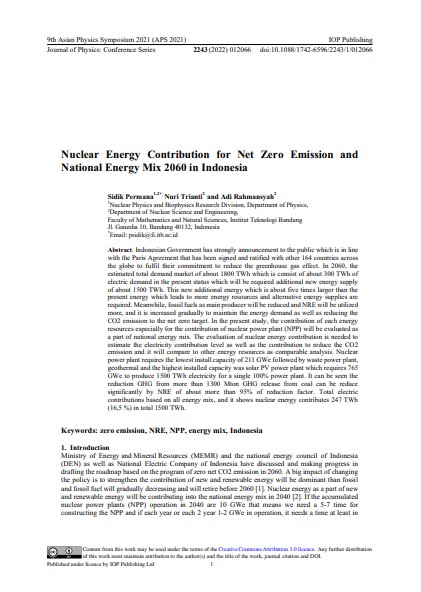
Keyword(s)
Energy mix , Indonesia , Net-zero , NPP , NRE , Zero emission
Author(s)
1,2) Sidik Permana, 2) Nuri Trianti2 and 2) Adi Rahmansyah
Country(ies)
Publisher
Published Date
Access
DOI
Indonesian Government has strongly announcement to the public which is in line with the Paris Agreement that has been signed and ratified with other 164 countries across the globe to fulfil their commitment to reduce the greenhouse gas effect. In 2060, the estimated total demand market of about 1800 TWh which is consist of about 300 TWh of electric demand in the present status which will be required additional new energy supply of about 1500 TWh. This new additional energy which is about five times larger than the present energy which leads to more energy resources and alternative energy supplies are required. Meanwhile, fossil fuels as main producer will be reduced and NRE will be utilized more, and it is increased gradually to maintain the energy demand as well as reducing the CO2 emission to the net zero target. In the present study, the contribution of each energy resources especially for the contribution of nuclear power plant (NPP) will be evaluated as a part of national energy mix. The evaluation of nuclear energy contribution is needed to estimate the electricity contribution level as well as the contribution to reduce the CO2 emission and it will compare to other energy resources as comparable analysis. Nuclear power plant requires the lowest install capacity of 211 GWe followed by waste power plant, geothermal and the highest installed capacity was solar PV power plant which requires 765 GWe to produce 1500 TWh electricity for a single 100% power plant. It can be seen the reduction GHG from more than 1300 Mton GHG release from coal can be reduce significantly by NRE of about more than 95% of reduction factor. Total electric contributions based on all energy mix, and it shows nuclear energy contributes 247 TWh (16,5 %) in total 1500 TWh.